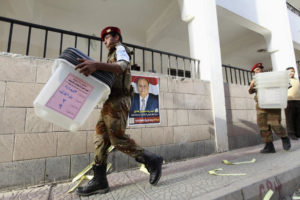 Following much anticipation, Yemenis this Tuesday headed towards the polling stations in the tens of thousands, with lines extending endlessly in the streets of the capital, Sana’a. And if so far the mood is festive, with men and women congratulating one another on what they hope will herald the coming of a new democratic era, the armed forces are fiercely on the lookout for any sign of trouble.
Following much anticipation, Yemenis this Tuesday headed towards the polling stations in the tens of thousands, with lines extending endlessly in the streets of the capital, Sana’a. And if so far the mood is festive, with men and women congratulating one another on what they hope will herald the coming of a new democratic era, the armed forces are fiercely on the lookout for any sign of trouble.
As announced by the Interior and Defense Ministries, over 100,000 troops were dispatched nationwide to guarantee not only the safety of electors but the electoral process itself, as armed factions warned they would work towards sabotaging the day. Despite much controversy surrounding the one-man presidential race, Yemenis resigned themselves, hoping that by saying yes to Abdu Rabbo Mansour Hadi, Ali Abdullah Saleh would hear a resounding no.
“We are now declaring the end of the Ali Abdullah Saleh era and will build a new Yemen,” said Yemeni Nobel Peace winner Tawakul Karman as she cast her vote. Both the ruling party and the JMP, the opposition block, have urged their fellow citizens to participate in great numbers as they stressed it is the only way to ensure the country’s stability and unity in the face of so much hardship. “Since soon-to be President Hadi will have for task to restructure the army and amend the Constitution, legitimacy is vital,” said Abdel Qader Qahtan, the Interior Minister.
But if politicians are determined to remain positive, claiming that February 21, 2012 marks the victory of the revolution over repression and dictatorship, activists and revolutionaries alike are less than impressed. Many feel that the political class, aided by western powers, hijacked the youth movement and allowed President Saleh to walk on his own terms rather than that of the people. “The election is a political scenario mapped out in the GCC initiative but in its essence it is irrelevant to the true ideals of democracy,” said Rana Jarhoum, a young activist.
Violence in the South
Medical sources in Aden, the southern regional capital of Yemen and an important sea port reported that clashes in between al-Harak, the southern secessionist movement, and the armed forces were threatening to spark yet another civil war. Doctor Abdel Mageed Kulaib reported by telephone that scores of injured were coming through the hospital he manages with the administration, having had to call back most of its medical staff to keep up. “I have seen passing through 2 children already. I don’t know of their current status but when I last saw them they were seriously injured.”
Following an RPG attack against a polling station yesterday in the center of Aden, al-Harak warned that it would send its militants to prevent the elections from taking place. This morning, armed men stormed several polling stations in the city, threatening to use violence if the ballot boxes were not thrown out in the street. Soon after clashes erupted, gunshots were heard and mayhem ensued. Residents said that tear gas canisters and live ammunition were being used against civilians, despite Field Marshall Abdu Rabbo Mansour Hadi’s promises on Monday that the armed forces would refrain from lethal violence.
“Secessionist sentiments have been brewing in South Yemen for over a decade now, anger is bubbling out and if the central government does not act swiftly, Aden will be engulfed in a violent armed conflict,” warned an al-Harak militant. He added that the South would never recognized Hadi as its legitimate President since the power-transfer proposal was merely provisioning for a reshuffling of the regime and not a real change of play, stressing that western powers and the Gulf had worked at derailing the true Yemeni revolution. “People are now going back home to get their weapons,” said a doctor, adding that he was worried it would trigger a chain reactions throughout the southern provinces prompting a destructive civil war. “People cannot take anymore disappointment or lies, Hadi does not mean change, he is the regime!” said an injured civilian.
Security analysts are now warning of a possible alliance between al-Harak and al-Qaeda as they share a common goal, the destabilization of the central government, stressing that it would put America’s war of terror under serious strain. Add to that the ever growing meddling of Iran in Yemen’s internal affairs and many say Yemen could become the perfect storm.
Under-Age Voting
Journalist Iona Craig reported on her twitter account that she had chatted with a boy of 16 who just had cast his vote and another who had dipped his fingers twice in ink. Several other witnesses in Sana’a said that under-age Republican Guards were being allowed to vote despite being clearly below the age limit. “It is ridiculous we all know who is going to win the elections anyway, why corrupt the system. It is bad enough that Yemen allows child soldiers, do we really need them to vote as well, marring our Constitutions with further crimes,” asked a voter near “Change Square.” Officials, however, deny any wrong doing, maintaining that the electoral process went smoothly and transparently.
And if it might seem pointless to fraud a one-man election, the coalition government knows it needs a high turn out to claim legitimacy and move on to the next stage of the power-transfer, the reconstruction of the military. Ahmed Ali Saleh, President Ali Abdullah Saleh’s eldest son, was seen in Sana’a casting his vote alongside several other military officers, while somewhere in the capital, his opponent, Sheikh Hameed al-Ahmar, also went to the polling station.